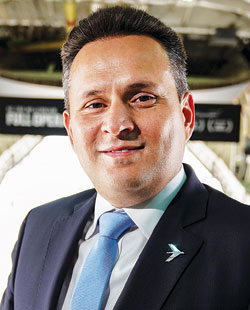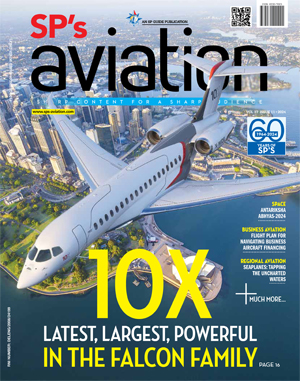INDIAN ARMED FORCES CHIEFS ON OUR RELENTLESS AND FOCUSED PUBLISHING EFFORTS

The insightful articles, inspiring narrations and analytical perspectives presented by the Editorial Team, establish an alluring connect with the reader. My compliments and best wishes to SP Guide Publications.

"Over the past 60 years, the growth of SP Guide Publications has mirrored the rising stature of Indian Navy. Its well-researched and informative magazines on Defence and Aerospace sector have served to shape an educated opinion of our military personnel, policy makers and the public alike. I wish SP's Publication team continued success, fair winds and following seas in all future endeavour!"

Since, its inception in 1964, SP Guide Publications has consistently demonstrated commitment to high-quality journalism in the aerospace and defence sectors, earning a well-deserved reputation as Asia's largest media house in this domain. I wish SP Guide Publications continued success in its pursuit of excellence.
Embraer is Open to Technology Transfer
Ahead of their KC-390 Millennium Day festivities, Embraer’s delegation took the opportunity to underscore their nation’s unwavering commitment to India, while underlining Embraer’s legacy of 54 years and its expansive portfolio of over 30 platforms.

Embraer’s delegation, visiting India for the KC-390 Millennium Day festivities, underscored their nation’s unwavering commitment to explore technology transfer possibilities to India for which they are looking at engaging various private enterprises and the Indian Air Force. João Bosco Costa Junior, President & CEO of Embraer Defense & Security, emphasised that Brazil, the Government of Brazil, and Embraer collectively embrace adaptability, pledging to tailor their offerings to meet the bespoke requirements of India and the Indian Air Force. Notably, they expressed a keen interest in presenting the KC-390 Millennium as a versatile multimission transport solution for India, while underscoring Embraer’s remarkable legacy of 54 years and its expansive portfolio of over 30 platforms.
“We are here to put forth a valuable case for India. We are even open to exploring first-hand technology transfer and sharing some Intellectual Property if needed in India. We are also exploring new alternatives of supply chain options for KC-390 and facilitating discussions about companies, production, operations, and even MRO,” he explained.
In light of the Indian Air Force’s (IAF) quest for medium transport aircraft (MTA), Brazilian aerospace behemoth Embraer made a resounding declaration, suggesting its intent to establish an assembly line for the C-390 Millennium aircraft within India, should it emerge victorious in the contract competition. The Indian Air Force has been contemplating the acquisition of 40 to 80 medium transport aircraft to replace its aging fleet of AN-32 planes. The Embraer delegation is meeting and discussing details with the IAF during this visit as well.
“We are here to put forth a valuable case for India. We are even open to exploring firsthand technology transfer and sharing some Intellectual Property if needed in India. We are also exploring new alternatives of supply chain options for KC-390 and facilitating discussions about companies, production, operations, and even MRO”
—João Bosco Costa Junior, President & CEO of Embraer Defense & Security
Bosco affirmed that the company is actively engaged in discussions with Hindustan Aeronautics Limited (HAL) and select Indian private enterprises to explore the feasibility of forging strategic partnerships and participating in the bidding process. The contenders vying for this prestigious contract include Embraer Defense and Security’s C-390 Millennium, Airbus Defence and Space’s A400M aircraft, and Lockheed Martin’s C-130J.
The Embraer Defense and Security leadership ardently advocated the suitability of the C-390 Millennium to fulfill India’s specific requirements, highlighting its cutting-edge technology, multifaceted mission capabilities, operational flexibility, and cost-effectiveness. Beyond just marketing the aircraft, Embraer Defense and Security also envisions setting up an assembly line in India to establish a Maintenance Repair and Overhaul (MRO) facility. It’s worth noting that the IAF had initiated the acquisition process in December of the previous year by issuing a Request for Information (RFI), to which Embraer promptly responded by proposing the C-390 Millennium as the preferred platform.
The C-390 can carry more payload (26 tonnes) compared to other medium-sized military cargo aircraft and flies faster (470 knots) and farther, being capable of performing a wide range of missions such as transporting and dropping cargo and troops, medical evacuation, search and rescue, firefighting, and humanitarian missions, operating on temporary or unpaved runways such as packed earth, soil and gravel. In its refueling version, the aircraft has already proven its aerial refueling capacity, as well as an aircraft receiving fuel from another KC-390 using pods installed under the wings. It is the only aircraft in the world in the segment to carry out such an operation.
Since entering operation with FAB in 2019, the C-390 has proven its capacity, reliability, and performance. The current fleet of six aircraft, all in the aerial refueling version, designated KC-390, has already accumulated more than 9,500 flight hours. Recent figures show an operational availability of around 80 per cent, with a mission completion rate above 99 per cent, demonstrating exceptional productivity in the category. The C-390 Millennium has orders from Portugal and Hungary, both NATO member countries. The Netherlands, also a member of NATO, selected the C-390 Millennium in 2022.
As part of its strategic agenda, Embraer has embarked on a mission to bolster relationships and consolidate ties with the Government, the Air Force, and the industrial landscape in India. Their primary objective is to gain a profound understanding of India’s requirements and objectives, while also identifying potential local collaborators for the realisation of their joint localisation plan. Bosco also suggested that discussions with certain private companies have been progressing positively, with forthcoming partnership announcements on the horizon.
Underpinning these endeavors is the firm backing of the Brazilian Government, which is resolute in its commitment to nurturing the relationship between Embraer and India, the Defense and Security CEO underlined. The leadership at Embraer emphasised the strategic significance of the Brazil-India relationship, which has been flourishing since the early 2000s. They underscored the substantial commonalities between the two nations, including shared cultural ties, vast territorial expanses, and their status as regional powerhouses. They assured that Embraer stands poised to actively contribute to India’s ‘Make in India’ initiative, offering resources such as training facilities, manufacturing units, technology transfers, and solutions that will mitigate import expenditures and maintenance complexities.
Embraer is diligently advancing towards achieving a substantial turnover of $8 billion over the next couple of years, with an average Compound Annual Growth Rate (CAGR) of 12 per cent across its principal business units, spanning commercial aviation, executive aviation, defence and security, services and support, and electric Vertical Takeoff and Landing (eVTOL) units, known as EVE.
In terms of its presence in India, Embraer boasts a fleet of 39 aircraft, comprising eight in the defence sector, eight in commercial aviation, and 23 in the executive category. During interactions with the media, Bosco extensively expounded upon the capabilities of the KC-390. In fact, on August 29, the company celebrated the KC-390 Millennium Day in New Delhi. “The event was a great platform to deepen engagement with the players in the industry as we strengthen the case of the C-390 Millennium for India. The vibrant discussions have paved the way for us to carve a unique proposition for India and the Indian Air Force,” said Bosco.
Embraer has firmly established its presence in India, boasting approximately 40 aircraft across various domains, encompassing defence, commercial aviation, and executive aviation. Amidst ongoing inquiries and inevitable comparisons with established market counterparts, particularly the C-130, Embraer maintains unwavering confidence in the KC-390’s suitability for the Indian market. They stress that their intent is not to engage in competition with established players but rather to present a win-win solution for India.
“The company envisions a long-term partnership and we are actively considering the prospect of making India a hub in our localisation plan. We view India as a repository of valuable human resources and impressive technological capabilities. Embraer anticipates a fruitful collaboration marked by technology transfer and development opportunities, particularly in the MTA project and the C-390 aircraft—which is a great opportunity in line with our long-term vision,” said Frederico Lemos, the Chief Commercial Officer for Embraer Defense & Security.
EMBRAER IN INDIA FOR THE KC-390 MILLENNIUM DAY
On the sidelines of the media briefing, Jayant Baranwal, Editor-in-Chief of SP’s Aviation asked a few quick pertinent questions to the Embraer Defense & Security leadership. Here are some excerpts from that interaction.

Q: Is there a distinction between C-390 and KC-390, both in nomenclature and their utility?
A: They are essentially the same. When we initiated our marketing efforts, we were uncertain whether a country would opt for the air-to-air refueling configuration. The platform is inherently capable of both scenarios; it’s ultimately up to the purchasing country to decide whether to include the air-to-air refueling kit. The aircraft is referred to as the C-390 Millennium, and air refueling is an additional, flexible capability that a country may choose to integrate based on mission requirements.
Q: You’ve mentioned the full support of the Brazilian government for the relationship between Brazil and India. Could you elaborate on this?
A: The Brazilian Air Force is prepared to go to great lengths to support India’s needs. Mr. Lula has a strong rapport with India and is well-informed about our endeavors here. The Brazilian government is fully cooperative and committed to facilitating whatever is necessary. We have local financial institutions that are firmly behind our financial proposals. All relevant Brazilian entities are working in unison to make this collaboration feasible, both in financial and operational terms. Mr. Lula and his team, as well as the Ministry of Defence and the military, have been immensely supportive. From my interactions with stakeholders in Brazil, they are prepared to offer whatever is required. They are keen on establishing a government-to-government partnership that can be showcased to the world.
Q: How does Brazil intend to address India’s technological requirements?
A: We are open to sharing intellectual property if needed, as we are the proprietors of this intellectual property on behalf of the Brazilian government. We maintain a high degree of flexibility when discussing such matters with the Indian government. Our commitment extends beyond mere discussions on final assembly or factory-produced components. Our objective is to impart knowledge and technology. We, as a flexible company and nation, are eager to foster this collaborative spirit.
Q: What would be the estimated age of this MTA from the time of induction? For how many years would it continue to be a healthy machine for the force?
A: We have defence platforms working for more than 30 years and we are confident that the C-390 can go beyond that with its flexibility and adaptability.






